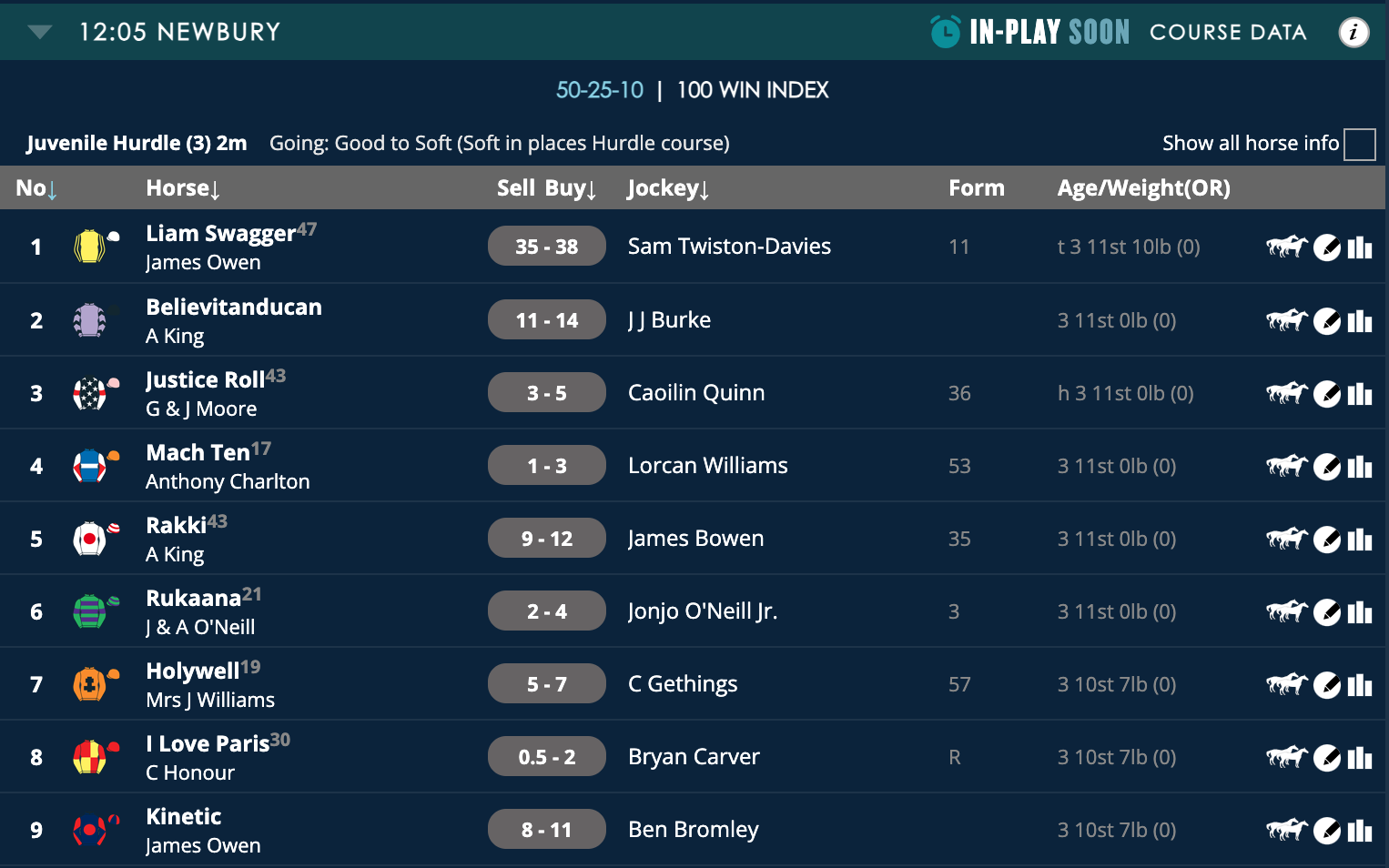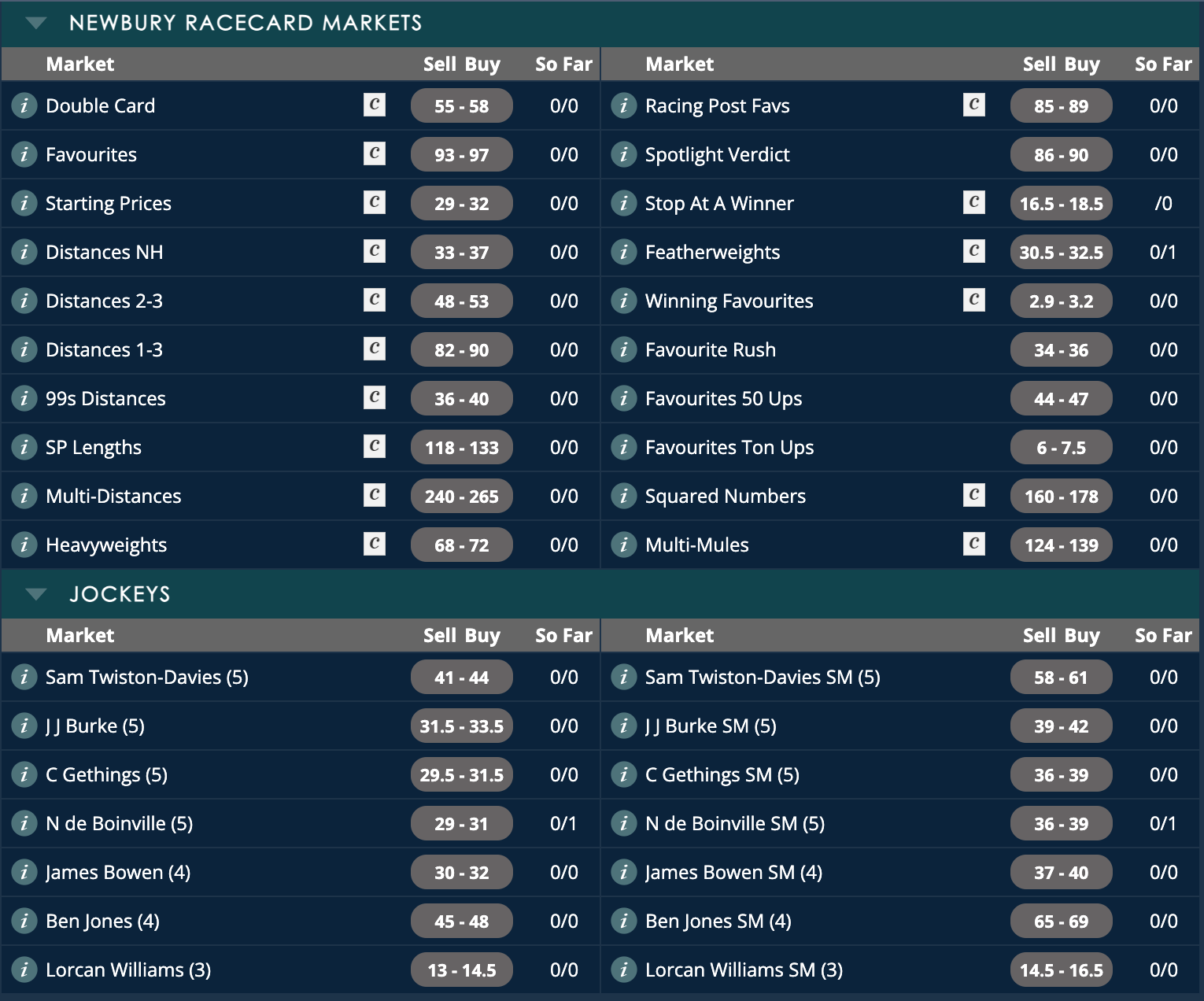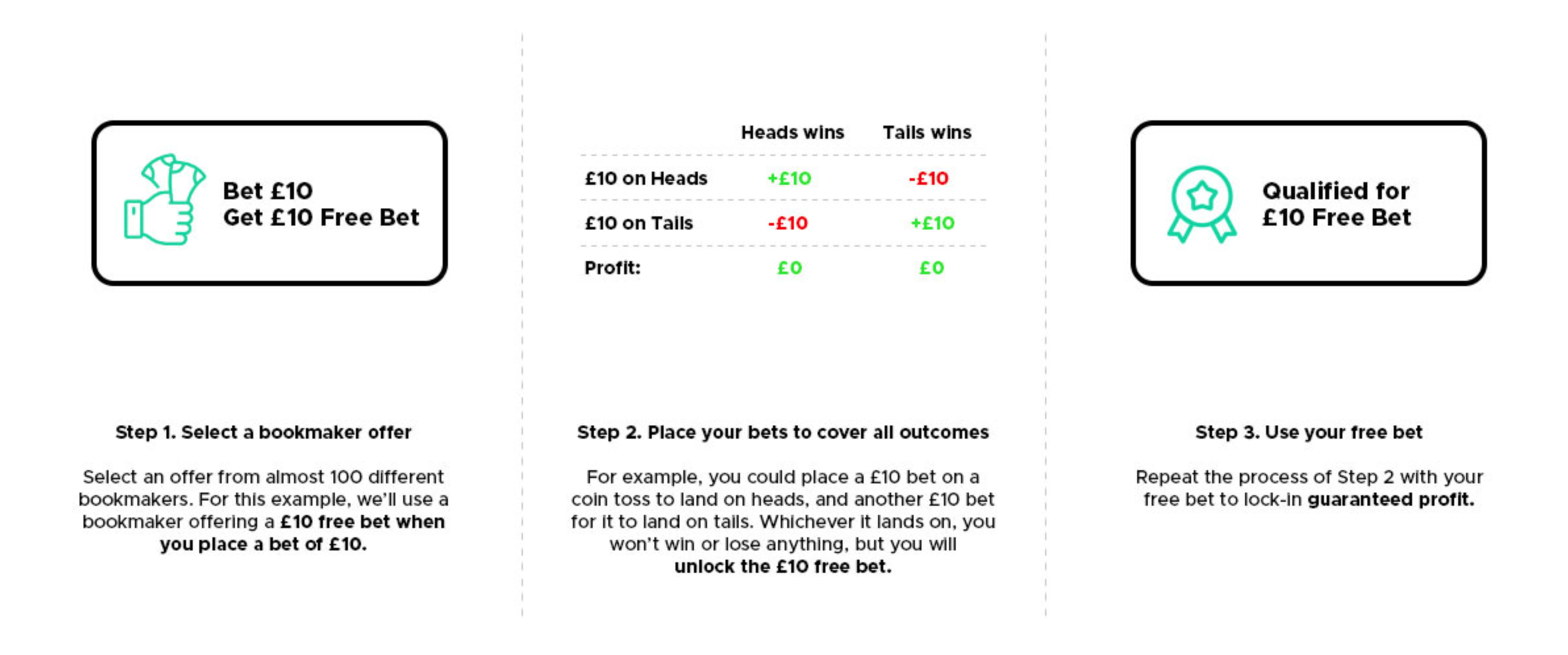How Does Spread Betting Work On Horse Racing?
Spread betting is a confusing enough concept to begin with for most of us - and plenty of people have never even heard of it at all.
But even once you’ve got your head around how it works on well known sports like football, it gets more confusing still when you try to apply its principles to horse racing.
In this article, we’ll take you through everything you need to know about how spread betting can be applied to horse racing, so that if you’d decide you’d like to try out spread betting, you’ll be fully equipped to do so.
We’ll also take you through great alternatives like Matched Betting, which can help you make rather more reliable profits from horse racing.
Whether you’re completely new to spread betting, or looking to branch out from football into more niche spread betting sports, you’re in the right place!
What Is Spread Betting?
Spread betting in sports betting is a type of bet where your winnings (or losses) are based on the accuracy of your wager. For a complete guide to spread betting, check out our dedicated article - but we’ll give you a quick rundown here if you just need a reminder of the basics.
For each market, a bookie will offer a particular ‘spread’ - a prediction of what the outcome will be.
The customer then bets on whether the outcome will be higher or lower than the spread - they ‘buy’, if they think it will be higher, and ‘sell’ if they think it will be lower. Their winnings or losses depend on the accuracy of that bet.
In most cases, you aren’t making a straightforward bet on who will come out the winner of a match or race, but on a certain statistic within the event. One of the most common statistics to bet on is Total Goals.
What really sets spread betting apart from standard fixed odds betting is the way your winnings or losses work.
Instead of betting at particular odds, your winnings (or losses) are calculated by multiplying your stake by the difference between the value you bought or sold at and the actual statistic in the match.
This means that you can end up losing more than your original stake, which is why spread betting can be much riskier than fixed odds betting.
The concept is hard to grasp when you first hear about it, but it gets easier to understand when you see it in action - so we’ll use an example to illustrate the principle. We’ll take an imaginary football match, and look at the Total Goals market.
In this case, we’ll say the spread offered by the bookie is 2.8 - 3. If we think the total number of goals in the match will be higher than 3, we would buy, whereas if we expect it to fall below 2.8 we would sell.
On the basis of a £10 stake, we would have the following outcomes if we decided to buy:
0 total goals - £30 loss ((0 - 3) x 10)
1 total goals - £20 loss ((1 - 3) x 10)
2 total goals - £10 loss ((2 - 3) x 10)
3 total goals - break even ((3 - 3) x 10)
4 total goals - £10 profit ((4 - 3) x 10)
5 total goals - £20 profit ((5 - 3) x 10)
6 total goals - £30 profit ((6 - 3) x 10)
And so on
And if we decided to sell, the outcomes would be as follows:
0 total goals - £28 profit ((2.8 - 0) x 10)
1 total goals - £18 profit ((2.8 - 1) x 10)
2 total goals - £8 profit ((2.8 - 2) x 10)
3 total goals - £2 loss ((2.8 - 3) x 10)
4 total goals - £12 loss ((2.8 - 4) x 10
5 total goals - £22 loss ((2.8 - 5) x 10)
6 total goals - £32 loss ((2.8 - 6) x 10)
And so on
You’ll notice that if you decide to sell there’s no theoretical limit to your losses. Of course, football games with 6 or more goals are vanishingly rare, but there is still the possibility of your losses becoming very high in an unusually high-scoring match.
If you’re new to spread betting, you should therefore get into the habit of working out your worst case scenario for any bet before you place it, to ensure you aren’t putting yourself in the position of losing more than you can afford.
What’s the difference between British and American spread betting?
You could be forgiven for assuming spread betting meant the same thing here and across the pond, but that’s not the case at all. In the USA, spread betting means something completely different, so make sure you’re clear about which you’re betting on!
American spread betting does bear some similarity to British spread betting, in that it involves betting on whether a certain statistic will come in higher or lower than a certain value.
However, in American spread betting you’re normally betting on the difference in points between two teams - more like a handicap bet than what we call spread betting in the UK.
For example, if a bookmaker advertises a spread of 4, you can bet on either the favourite or the underdog.
If you bet on the favourite, they need to win by a margin of at least 4 for you to win your bet. If you bet on the underdog, meanwhile, they need to lose by a margin of less than 4 (or to win outright) for you to win your bet.
Which Bookies Offer Horse Racing Spread Betting In The UK?

Spread betting is growing, but it’s still pretty niche. Most mainstream bookies don’t offer spread betting markets at all, so if you’re keen to get into spread betting you’ve only got a couple of real options: Spreadex and Sporting Index.
If you check out their websites and feel like they’re eerily similar, it’s because Sporting Index was acquired by Spreadex in 2023. The two bookies are practically identical, meaning that there’s little to choose between them save their welcome offers (Spreadex is a bit more generous).
When it comes to the spreads they’re offering, you’re unlikely to see any difference between the two sites, so it’s mostly a matter of choosing which colour scheme you’d rather be looking at when deciding which to use.
Types Of Horse Racing Spread Betting Market
Obviously, with horse racing there’s no such thing as a ‘total goals’ market, or anything remotely similar, so spread betting has to work rather differently.
In many cases, points are assigned to each horse or jockey depending on their performance - for example, a jockey might receive 25 points for each winner they ride over the course of a day’s racing, or a horse might receive a certain number of points for winning or placing in its race.
The beauty of spread betting is that it will work with any statistic that can be assigned a numerical value, so there’s no shortage of spread betting markets for horse racing to choose from. We’ll run you through some of the most popular markets here.
50 index betting (also known as 50-25-10)
In a race, the horses that come in 1st, 2nd and 3rd place are awarded points of 50, 25 and 10 respectively (no other places receive points). The customer bets on whether a certain horse will achieve a higher or lower number of points than the spread.
A favourite will be assigned a pretty high spread, with other horses receiving much lower spreads. This means that there’s higher risk when backing a favourite, especially when staking a large amount of money, as if it fails to come in your losses will be multiplied by the difference between its points and the buy value of the spread.
As an example, take a look at this racecard for the 12:05 Newbury:

We can see that Liam Swagger is the clear favourite. If we choose to buy at 38 with a stake of £10, and Liam Swagger does win the race, we stand to win £120. On the other hand, if he comes in 2nd place, receiving 25 points, we would lose £130, and if he came in 3rd we’d lose £280.
If he failed to even place, we’d lose £380 - a huge risk from a £10 stake.
Meanwhile, if we choose to sell at £10, the worst that could happen would be if Liam Swagger won the race, which would lose us £150.
Buying on a long shot drastically reduces your risk, and also increases the potential return if your pick goes on to win. If we went for Mach Ten, for example, and bought at 3 with a stake of £10, the most we could lose would be £30 if the horse failed to place.
But if he managed 3rd, 2nd or 1st place, we’d win £70, £220 or £470 respectively. Of course, the counterpoint to this is the fact that a long shot is far less likely to achieve a place.
100 win index
This works similarly to 50 index betting, except it’s much more of an all-or-nothing scenario. A winning horse receives 100 points, but nothing for a place. You do, however, receive 50 points if a horse wins in a dead heat.
The risk is therefore even higher than with 50 index betting, though the rewards are of course higher as well.
Other racecard markets

A number of other markets will also be available for an individual race. In this case, we have the following:
- Double number of winner. The saddle cloth number of the winner of the race multiplied by two.
- Favourite performance. The number of points the favourite gets in the race, with 25 points for a win, 10 points for 2nd place and 5 points for 3rd.
- SP of winner. The starting price of the winner of the race (capped at 100).
- Race squared number. The racecard number of the winning horse multiplied by itself (squared).
- Race multi-mules. The racecard number of the winning horse multiplied by the racecard number of the 2nd placed finisher.
And if you ever come across a market you don’t understand, the info symbol to the left of the market will explain how it works.
Daily markets

As you can see, there’s an enormous range of markets for the entire day’s racing at that meeting.
Jockeys markets are based on the performance of an individual jockey over the course of all their races that day, with points assigned for the number of wins or places they achieve.
Other markets include:
- Double card. The total of the racecard numbers of the winning horses for all races multiplied by 2.
- Favourites. The total performance of the horses sent off as favourite for all races, with 25, 10 and 5 points awarded for 1st, 2nd and 3rd places respectively.
- Starting prices. The total of the starting prices of the winning horses for all races.
- Distances NH. The total of the winning distances for all races.
There is a wide variety of markets available, many of them quite convoluted. As with individual racecard markets, simply hover over the info symbol to find out how a particular market is calculated.
Is Spread Betting On Horse Racing Worth It?
That’s a good question. Spread betting is, by nature, more volatile than fixed odds betting, with scope for extremely high wins and losses.
Many people find spread betting more exciting than fixed odds betting because of this - but that’s not necessarily a good thing.
Successful sports betting relies on calm, logical decision-making, and spread betting is far more likely to result in emotional decision-making.
It’s also likely to be even more problematic for anyone struggling with gambling addiction than regular sports betting.
For this reason, unless you’re only planning to place a very occasional low stakes spread bet, we’d advise steering clear of spread betting, whether on horses or other sports.
If you’re hoping to find a good way of making solid profits through sports betting, there are much, much better options, as we’re about to see.
Why Not Try Out Matched Betting?
It must be said that Matched Betting doesn’t offer quite the excitement of spread betting. Rather than closely watching a race, with every small change a potential boost to your profit, you usually won’t even care whether your selection wins, as you’ll know in advance exactly how much you’ll make regardless.
But if you’re looking for a way of guaranteeing profit through sports betting, Matched Betting is absolutely the way to go - so long as you follow the instructions correctly.
Matched Betting involves placing bets both for and against a certain outcome to earn free bets, which allow you to make a profit regardless of the result.
Most offers run along the lines of ‘Bet £10 and get a £10 free bet’. By matching the first bet, you break even - and you’re then able to make a profit on the free bet.

To find out more, take a look at our beginner’s guide to Matched Betting. Or alternatively, if you’re comfortable with the basics and want to get going, sign up here for our free trial and gain access to bookie offers worth over £850 in profit.
Summary
Spread betting on horse racing isn’t easy to get your head round, especially if you’ve never tried spread betting before at all, but once you understand the principles it starts to make more sense - even if some of the actual markets sound insanely convoluted.
That said, there’s no getting away from the fact that spread betting in general, and in many cases especially on horse racing, is a high risk activity. If your ultimate goal is to come away in profit, you’re far better off trying out Matched Betting. It might not be quite so exciting but, instead of the possibility of unlimited losses, it offers a guarantee of profit, provided you follow our instructions correctly.
Updated: 20 Jan 2025
The Author
Stephanie is a published author and, having taken up Matched Betting fairly recently, she knows exactly how beginners feel when they first start Matched Betting. She loves breaking down complex subjects in straightforward terms to make them accessible to newcomers, and to speed them on their way to making their first profits.

